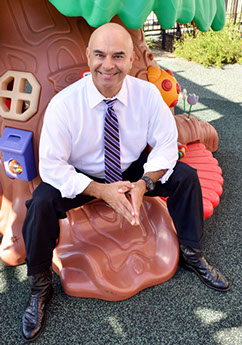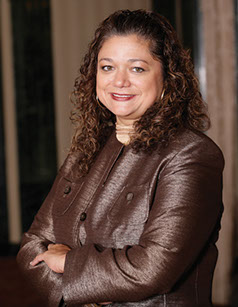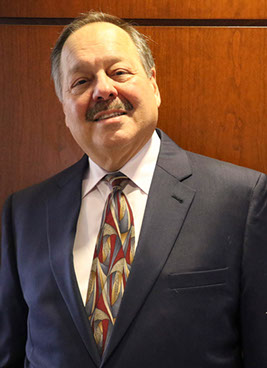

“As Latino children go…so goes the future of this nation.” That is how I was quoted and re-tweeted from an Aspen Institute presentation earlier this year. I said that because it is true. Any national demographic trend, statistics and reports support this. Most everyone has sat through countless presentations or read articles or reports that show that the Latino community is the fastest growing, youngest, least educated, lowest wage earners….and the list goes on. In fact, the Latino community has the distinct honor of being at the top or bottom of most every negative social indicator. So what?
If these trends continue our nation could lose its greatness.
 Education is critical and reading is a key indicator for a child’s academic success. The inability to read with peers by the fourth grade, dramatically increases the risk of dropping out of school. According to an Annie E. Casey Foundation report, this translates into 83 percent, or 6.6 million low-income children in the U.S. are at risk of dropping out of high school. English language learners are at greater risk. They are at a full year behind native English speakers in reading by the first grade—a chasm that widens to two-years by the fifth grade.
Education is critical and reading is a key indicator for a child’s academic success. The inability to read with peers by the fourth grade, dramatically increases the risk of dropping out of school. According to an Annie E. Casey Foundation report, this translates into 83 percent, or 6.6 million low-income children in the U.S. are at risk of dropping out of high school. English language learners are at greater risk. They are at a full year behind native English speakers in reading by the first grade—a chasm that widens to two-years by the fifth grade.
Additionally, reports show that “two out of three eighth-graders can’t read proficiently; almost that many are below par in math and nearly 75 percent cannot write capably,” according to The National Assessment of Educational Progress.
The effects of lagging behind last a lifetime and stress our society from teen pregnancy to higher incarceration rates to increased poverty. Census projections show 36 million job openings over the next 10 years that will require education beyond high school, but we are on track to lack an estimated 5 million qualified workers to fill those jobs.
What can our country and the Latino community do? I believe that the earlier the intervention, the more success. And we know that the return on investment is greater the earlier you start. For every dollar invested in early childhood education the public gets a return of around $8 according to Nobel Prize winner James Heckman.
For forty years AVANCE, Inc. has administered a two-generation Parent Child Education program that focuses on “the parent as the first teacher and the home as the first classroom.” Our curriculum is administered to caregivers and their children ages zero to three. This approach gives the adult the tools to understand that the decisive time to assist with the cognitive, social, emotional and physical development of these children occurs within the first three years. This is when over 60 percent of the brain development occurs.
In addition, studies indicate low-income children hear approximately 30 million fewer words by age 4 than their wealthier peers – and develop half the vocabulary. Research from Stanford University found this ‘word gap’ begins affecting intellectual processing as early as 18 months. This period is critical because if these children start school behind their peers, it is unlikely that they will ever catch up.
AVANCE is a nonprofit that lives the mission of Unlocking America’s Potential by strengthening families in at-risk communities through effective parent education and support programs. What began in a single room in a San Antonio housing project has blossomed into a nationally recognized organization with sites across the country. AVANCE has empowered Latino parents to break free of the chains of poverty and to pave the way for a bright future for their themselves and their children.
Our methods are proven. An external study of AVANCE’s Parent-Child Education Program showed that participation by parents led to changes in education and socio-economic status. This Intercultural Development Research Association (IDRA) report showed that the AVANCE program had positive effects on families long after they graduated – especially, for those families who needed it the most. Not only were the AVANCE students school ready when they entered kindergarten, their dropout rate was much lower than their peers (10 percent vs. 33 percent of Texas Hispanic students). AVANCE parents had dramatic increases in educational attainment, better jobs and home ownership.
The future of our country – our workforce, our national security, is dependent on the education of Latino children. And early childhood education and parental engagement is the decisive point to keeping this nation great. We owe it to our children to give them the future they deserve by investing in two-generation approaches. The return on investment in parent-child education programs is significant and cannot be delayed.
It must begin at birth and at home – every home.
Richard “Rick” Noriega is president and CEO of AVANCE, Inc., and can be reached at rnoriega.nat@avance.org.

This winter has been brutal! Even the mild weather states have been hit, but with record snow and temperatures below zero, it has been hard to get motivated to leave the house (beyond work and standard outings). That being said, time for loved ones has been limited, but with my parents getting older and less mobile it is up to me to make the journey (even though they may have way more leisure time on their hands!). Bearing the cold, I venture out to get my loving hugs and “baby girl” fix as for 10 years I was the youngest in my family.
As the years have gone by, my parents have become more fragile and their thoughts slightly scattered, but their unconditional love and thoughts of goodwill continue to motivate and inspire me. Believe me, they are a lot of work when I go visit them, but I can hardly complain with all the problems I caused for them as I was being raised (being a hyperactive child with bouts of seizures due to epilepsy which I thankfully outgrew).
unconditional love and thoughts of goodwill continue to motivate and inspire me. Believe me, they are a lot of work when I go visit them, but I can hardly complain with all the problems I caused for them as I was being raised (being a hyperactive child with bouts of seizures due to epilepsy which I thankfully outgrew).
The hour drive, the stop at the grocery store to bear gifts, the errands I will run once I get there, the mail I will need to review, the new ailments that will need to be discussed and analyzed, the number of relatives that have passed or have taken ill to be evaluated, the complaints my Father will have about my Mother, or my Mother will have about my Father. I think to myself how people often revert back to children as they become older – losing hair, teeth, needing help just getting around the house (worrying if your parents are going to fall down the stairs!), to the attention they crave from their children.
A home once filled with 7 children screaming and laughing is now strangely silent and slightly depressing as I enter. I bring a bag of oranges, pretzel chips, croissants, and a bottle of Tylenol (the minimum basic deliverables for each trip home) and their faces light up as they are so proud to see their daughter remember these small things that make such a difference to them. They are eager for conversation and company.
They both slowly get up to give me a hug and work to try and get me a cup of coffee or drink – I tell them, “Estoy bien, no necesito nada,” but they will not be satisfied until I accept something. I glance at the end table, where there are two shoeboxes –one filled with my Father’s meds and the other with my Mother’s. The days of the week are scribbled with black marker on the top of the pill bottle caps, and all the caps are slightly crooked – I think to myself it is a small miracle they are still functioning, and how I may be staring into my future.
We sit down for coffee (with Univision – typically a telenovela blaring in the background) and they often tell me the same stories, but I find comfort in their words and thank God they are still alive. I know many who have lost their parents recently (given our ever increasing ages) and I value the time I have left with them. Of course, they also both want their private time with me, which means a movie with Mom, and a meal outing with Dad if he is up to it (otherwise I need to bring him a fish fillet from McDonalds and onion rings from Burger King – “porque no le gustan las papas fritas!”
The entire day passes and by 9:00 PM I am ready to depart for my hour-long drive back home. However, it is never a quick goodbye. “Mija porque no te quedas, es muy tarde – y así hablamos un poco más y descansas.” Another 15 minutes pass and I finally head home, content and warm inside.
Now as the weather thaws and the sounds of chirping birds can be heard, my hope is to plan some adventures that will build additional lasting memories with my parents. Simple things often go the furthest such as painting a picture together or walking slowly through a garden. I always have a camera in my hand ready to capture the moments realizing that time is passing too quickly and never knowing what the next day will bring. Laughter echoes in my ears from prior adventures when my Father and Mother jokingly posed for the pictures and poked fun at one another.
I love these times and continue to build visual memories that I can embrace forever. Mother and Father’s Day is fast approaching and I feel compelled to share my love and the routine I have with “Mis Padres” (nightly calls and a minimum of 2 visits a month).
Here is to hoping you have your own treasured moments with your parents, or that at a minimum, I have encouraged you to build them.
Alma Guajardo-Crossley is the Director for Diversity Initiatives, GM.

I’m running for Mayor of Philadelphia for one simple reason: to give every child in our city the same opportunity to get into the middle class that I had. This needs to be a City of Opportunity for all, and we need a Mayor who won’t shy away from the tough challenges but will tackle them head on and won’t take no for an answer. We have the highest poverty rates of any major American city and that has to change. In order to accomplish that, we have to fix our schools, bring jobs back to our city, and reduce the crime rate while improving police-community relations.
The challenges facing the Latino community in Philadelphia are emblematic of those facing our community across  the country. We are a growing, vibrant, and diverse community, but one that isn’t always respected by the mainstream in Philadelphia. At the same time, failing public schools are particularly harmful to minority students without other options. This is a race that Latinos should be especially cognizant of.
the country. We are a growing, vibrant, and diverse community, but one that isn’t always respected by the mainstream in Philadelphia. At the same time, failing public schools are particularly harmful to minority students without other options. This is a race that Latinos should be especially cognizant of.
I know what it will take to create opportunity because this isn’t theory to me: it’s my life. Growing up in Harlem, I didn’t get to sleep in a bed until my family got access to public housing when I was ten years old. I got in trouble in school because our rat and mold-infested tenement was making me sick, and because I couldn’t speak English well enough to participate in the classroom.
The community was there for me, though, and – eventually – so was my school. So when I tried to turn my life around at fifteen, I was able to get an education and get out of poverty. No one thought I’d be able to go to college or go to law school, but through hard work and faith I was able to accomplish things that would have seemed impossible to me as a young man struggling to live up to my potential.
Today in Philadelphia, many of our children never even get the chance that I had. We label them problems and discard them, leaving so much potential untapped. It’s tragic to see how our failed schools are trapping our children in a repeated cycle of poverty. These kids are smart and talented, and if we give them the opportunity they’ll flourish just like I did. I had a lot of friends who were much smarter than me growing up who fell victim to drugs, or AIDS, or got trapped in the criminal justice system. We can’t afford another generation of that same failure.
Ensuring that every child gets a quality education has to be our top priority as a city, because it impacts everything else that happens in our city. If our children are educated, they’ll be able to get high quality employment. If we have an educated workforce, and if we reform our tax structure, businesses will want to locate here. And if our children are educated, they won’t make trouble and our crime rate will go down. Every issue comes back to education because it’s the biggest key to success.
Fixing our schools requires us to change our management structure by bringing back local control and getting rid of the state-controlled School Reform Commission. The SRC has been in charge of Philadelphia’s schools for 13 years and hasn’t reformed a thing. Our schools have arguably never been in worse shape, and the state has already broken its agreement to provide full funding in exchange for control. We need to put parents in charge and then begin implementing system-wide changes to implement best practices.
What’s so frustrating about watching our schools deteriorate is that we know what works in education and just aren’t doing it. My own children went to Philadelphia public schools and got a quality education, so I know this is possible. If you show me a high performing public, charter, or private school you’ll see major similarities. You’ll see empowered teachers and principals with adequate resources. You’ll see engaged parents and an engaged community. You’ll see wraparound services that help children with health, mental health, or nutritional issues. You’ll see engaging extracurricular activities that keep kids active and happy.
Some of these changes will cost more money; that’s why I have a bold plan to raise more revenue for our schools and shift the burden off of the working class, middle class, and small businesses – all of which are struggling. Some of it only requires an empowered Mayor you can hold accountable for the success or failure of our city.
That’s the heart of my approach as we make our choice in a historic election. Put an executive in charge, and hold him or her accountable for results. My election would be a historic change for Philadelphia, and I hope you’ll join me on that journey.
By Nelson Diaz